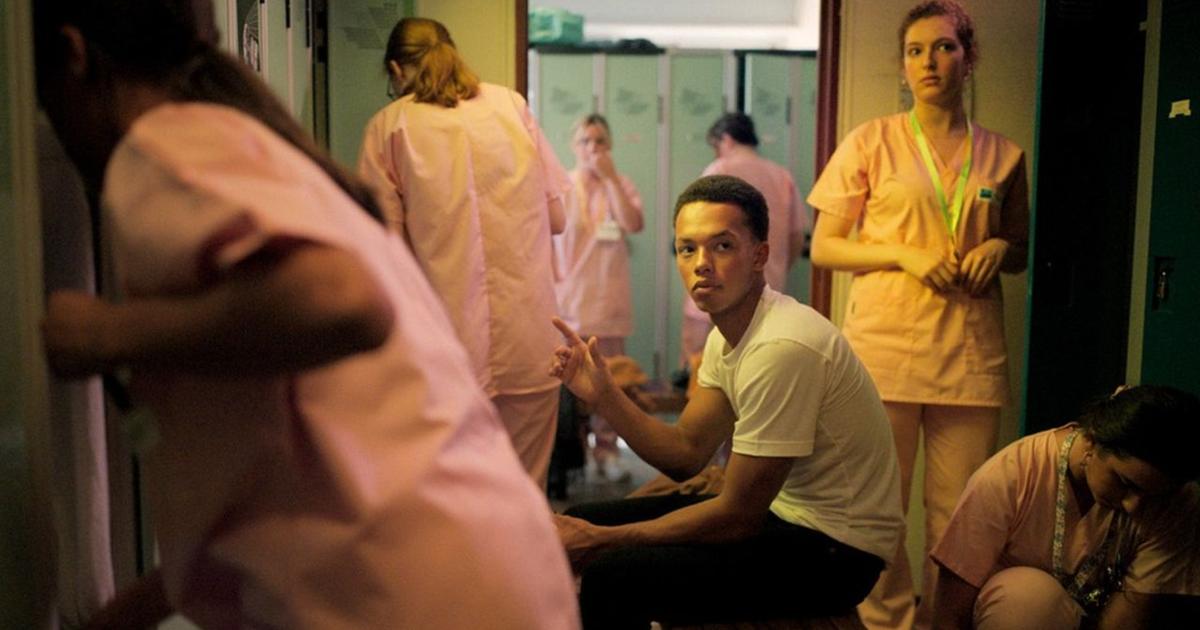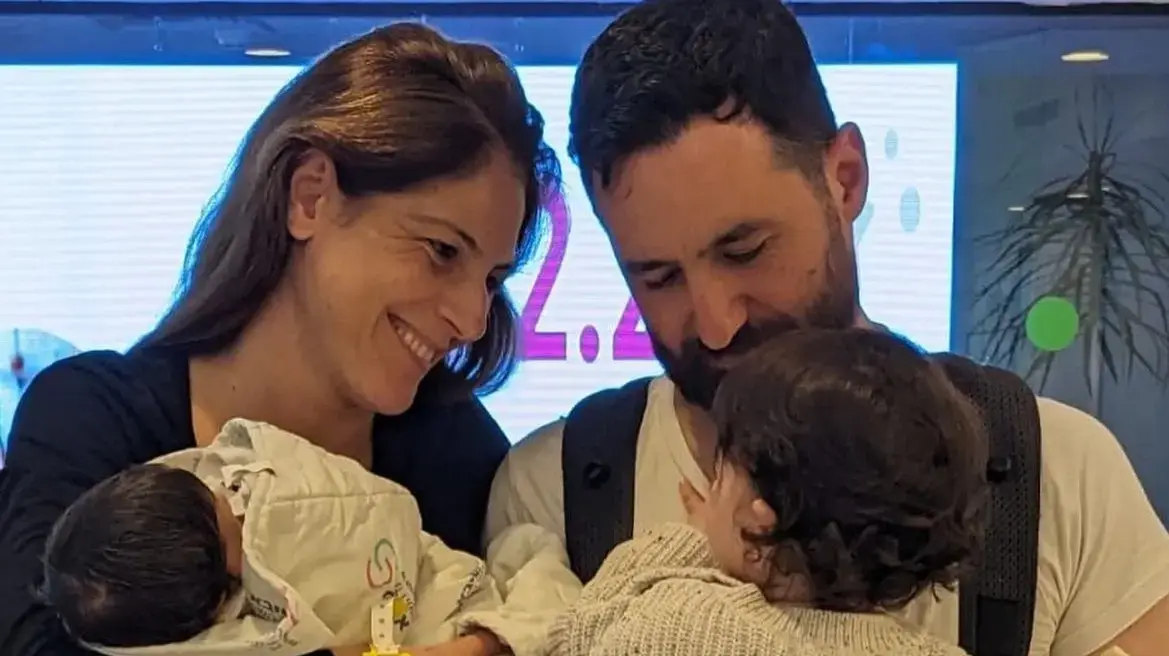It is the story of a young man, Léopold, who embraces the "most beautiful profession in the world", that of midwife.
After failing the medical entrance exam, it is "by default" that he joins a course in midwifery, which trains students aspiring to this profession.
In
Sage-Homme
, by Jennifer Devoldere (in theaters since March 15), Léopold (Melvin Boomer) fears the gaze of society, of his relatives and that of his father above all, who is a bit macho.
If he gets involved without much enthusiasm, his meeting with Nathalie (Karin Viard), a passionate midwife, will be enough to open his eyes to a profession that is based on benevolence, know-how, and not gender.
The film's script is not devoid of truth.
Although the profession has been open to men since 1982, it is still rarely chosen by students.
According to the Department of Research, Studies, Evaluation and Statistics (DREES), in 2022, only 4.5% of midwives were men.
Christian Jean, 47, is one of them.
This midwife (not a midwife, the term "woman" refers to the woman being cared for) started school 28 years ago.
For
Madame Figaro
, he looks back on this time when only 80 men were graduates against 19,000 women, and where sexist remarks were rife.
He remembers the place he had to make for himself in a very feminine world, his first deliveries and his precious encounters with patients, true safeguards of his motivation.
In video, the trailer of the film "Sage-homme"
Miss Figaro. -
Unlike the hero of the film, maieutics has never been, in your eyes, a default choice.
What prompted you to choose this profession?
Christian Jean.-
My medical vocation dates back to childhood.
At 6 years old, I spent a lot of time in the hospital, I even almost died there because of an epidemic of meningitis which affected several children.
Among them, I was the only one to survive, thanks to the white coats.
Since then, I have retained an infinite gratitude towards those who saved me.
Growing up, I frequented the maternity ward to visit aunts, cousins or neighbors who had just given birth.
I remember a very happy atmosphere.
I gazed at babies through the window of the nursery, I met parents all smiles... I discovered that the profession of midwife was more oriented towards life and less towards illness and death, like the doctor's.
I understood that it
Read alsoWhat does giving birth without an epidural really look like?
Men are still very much in the minority in midwifery schools. 28 years ago, how were you received at school?
I felt very alone.
In my time, of the 19,000 qualified midwives in France, there were 80 men.
In Marseille, where I studied, I was the fourth man from my school to graduate, and not without difficulty.
From the first day, students made it clear to me that my opinion would never be taken into account.
Clearly, I was "a guy" so my word would always come after that of my colleagues.
I also bothered the management team, represented at the time by university maternity directors and for whom childbirth was a women's affair and medicine a men's affair.
It was inconceivable for them to imagine that a man could accompany the birth without having given life.
What was completely aberrant, it comes down to thinking that
And in the hospital?
From the first stages, I bothered the medical team.
I was a Y chromosome in an X world. Everyone wondered what I was doing there, how they should behave with me.
If I was hazed like any other student, I still had the feeling that sometimes more was demanded of me because of my gender.
For example, I was not allowed to sit during a 12-hour call and I had to give tit for tat answers to questions about a pathology that I had not yet addressed in class.
To find it inconceivable that a man can accompany birth without having given birth is like thinking that you have to have had cancer to be a cancer specialist.
Christian Jean, midwife
What helped you stay the course?
As the character of Karin Viard says in the film: at some point, you have to “let out your own cry”.
So I redoubled my efforts to prove myself.
It required me to make sacrifices, to do extra hours and internships instead of going on vacation, for example, but it paid off.
I was able to win the support of my midwife instructors at the time.
A head nurse who had just given birth offered me her trust and let her baby take the first bath.
After observing me, she told me “the job suits you very well”.
I had his endorsement.
How do future parents react when they see you for the first time?
We often create a surprise when we introduce ourselves to the patient.
When I was younger, people took me for the nurse, for the intern or the extern in medicine, or the doctor.
From experience, I know that everything is played in the first 15 seconds.
If you arrive looking down, almost apologizing for being there, it's lost.
So when I go into a delivery room, I introduce myself straight away: “Hello, I'm Christian, I'm your midwife and I'm going to take care of you from now on”.
Read alsoThese twenty-somethings who are followed by a midwife and no longer by a gynecologist
Do you remember your first childbirth?
Of course.
This is the moment that all freshmen look forward to and anxiously wait for.
The first time “I put on the gloves”, as we say in our jargon, was during my first shift.
I was barely arriving when they took me to the delivery room.
Usually, students practice four-handed delivery with a fellow graduate to control the delivery of the child and protect the woman's perineum, but that was not my case.
This was the patient's seventh delivery, so everything happened very quickly.
I remember having experienced an incredible feeling that still moves me today.
Since then, as soon as a delivery goes well, respecting the patient's physiology and desires, I am soaring with happiness the following days.
From the first stages, I got in the way of the medical team.
I was a Y chromosome in an X world
Christian Jean, midwife
Reality is not always rosy and the film
Sage-Homme
shows it.
Pace, lack of recognition and death are also an integral part of the job...
Yes, everything can change in a minute.
One day, a patient suffered a cataclysmic hemorrhage during childbirth.
I remember running through the streets of Paris, in the rain, to get to the blood bank.
Fortunately, I had just traded in my plastic clogs for new sneakers (laughs).
Thanks to them and the help of my colleagues, this woman survived.
She could have died five times but she survived.
Being a midwife also means experiencing difficult things such as fetal death in utero or medical termination of pregnancy.
It's hard, sometimes it's hard for you, but it's part of the job.
Since 2008, you left the hospital environment to turn to the liberal. Why this choice ?
Because at the hospital, we are experiencing an unprecedented crisis.
Working conditions are deteriorating in all departments, even in maternity wards.
This leads to student burn-out and the departure of midwives from these structures.
And the Covid crisis has accelerated this process.
The current government is ignoring our demands.
Certainly, we are gaining recognition of our medical status by adding a sixth year of study to our course and obtaining a doctorate at the end, but the salaries do not follow.
How to motivate students if the remuneration is not up to their level of training?
Even when you reach managerial positions in the hospital, as was my case, you don't get rewards, but grievances from members of the
team who are dissatisfied.
Honestly, I am extremely worried about the future of our profession.
What keeps me from leaving the profession are the patients, those who struggle to get an appointment with a gynecologist.
Our profession is necessary for them, whether to accompany a birth, save breastfeeding from a bad start or monitor their gynecological health.
In video, eight received ideas about prohibitions during pregnancy





/cloudfront-eu-central-1.images.arcpublishing.com/prisa/L64PMGMKXNDP5EHGZTYIAK3UTU.jpg)





